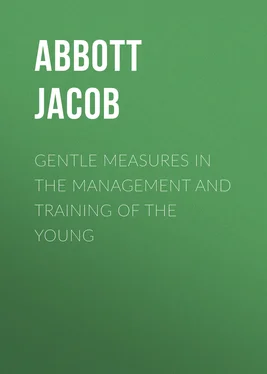Jacob Abbott - Gentle Measures in the Management and Training of the Young
Здесь есть возможность читать онлайн «Jacob Abbott - Gentle Measures in the Management and Training of the Young» — ознакомительный отрывок электронной книги совершенно бесплатно, а после прочтения отрывка купить полную версию. В некоторых случаях можно слушать аудио, скачать через торрент в формате fb2 и присутствует краткое содержание. Жанр: foreign_edu, pedagogy_book, upbringing_book, на английском языке. Описание произведения, (предисловие) а так же отзывы посетителей доступны на портале библиотеки ЛибКат.
- Название:Gentle Measures in the Management and Training of the Young
- Автор:
- Жанр:
- Год:неизвестен
- ISBN:нет данных
- Рейтинг книги:5 / 5. Голосов: 1
-
Избранное:Добавить в избранное
- Отзывы:
-
Ваша оценка:
- 100
- 1
- 2
- 3
- 4
- 5
Gentle Measures in the Management and Training of the Young: краткое содержание, описание и аннотация
Предлагаем к чтению аннотацию, описание, краткое содержание или предисловие (зависит от того, что написал сам автор книги «Gentle Measures in the Management and Training of the Young»). Если вы не нашли необходимую информацию о книге — напишите в комментариях, мы постараемся отыскать её.
Gentle Measures in the Management and Training of the Young — читать онлайн ознакомительный отрывок
Ниже представлен текст книги, разбитый по страницам. Система сохранения места последней прочитанной страницы, позволяет с удобством читать онлайн бесплатно книгу «Gentle Measures in the Management and Training of the Young», без необходимости каждый раз заново искать на чём Вы остановились. Поставьте закладку, и сможете в любой момент перейти на страницу, на которой закончили чтение.
Интервал:
Закладка:
The lesson which we deduce from this illustration and the considerations connected with it may be stated as follows:
That the rewards conferred upon children with a view of connecting pleasurable ideas and associations with good conduct should not take the form of compensations stipulated for beforehand, and then conferred according to agreement, as if they were of the nature of payment for a service rendered, but should come as the natural expression of the satisfaction and happiness felt by the mother in the good conduct of her child—expressions as free and spontaneous on her part as the good conduct was on the part of the child.
The mother who understands the full import of this principle, and whose mind becomes fully possessed of it, will find it constantly coming into practical use in a thousand ways. She has undertaken, for example, to teach her little son to read. Of course learning to read is irksome to him. He dislikes extremely to leave his play and come to take his lesson. Sometimes a mother is inconsiderate enough to be pained at this. She is troubled to find that her boy takes so little interest in so useful a work, and even, perhaps, scolds him, and threatens him for not loving study. "If you don't learn to read," she says to him, in a tone of irritation and displeasure, "you will grow up a dunce, and every body will laugh at you, and you will be ashamed to be seen."
But let her imagine that she herself was to be called away two or three times a day, for half an hour, to study Chinese, with a very exacting teacher, always more or less impatient and dissatisfied with her progress; and yet the irksomeness and difficulty for the mother, in learning to decipher Chinese, would be as nothing compared with that of the child in learning to read. The only thing that could make the work even tolerable to the mother would be a pretty near, distinct, and certain prospect of going to China under circumstances that would make the knowledge of great advantage to her. But the child has no such near, distinct, and certain prospect of the advantages of knowing how to read. He has scarcely any idea of these advantages at all. You can describe them to him, but the description will have no perceptible effect upon his mind. Those faculties by which we bring the future vividly before us so as to influence our present action, are not yet developed. His cerebral organization has not yet advanced to that condition, any more than his bones have advanced to the hardness, rigidness, and strength of manhood. His mind is only capable of being influenced strongly by what is present, or, at least, very near. It is the design of Divine Providence that this should be so. The child is not made to look forward much yet, and the mother who is pained and distressed because he will not look forward, shows a great ignorance of the nature of the infantile mind, and of the manner of its development. If she finds fault with her boy for not feeling distinctly enough the future advantages of learning to lead him to love study now, she is simply finding fault with a boy for not being possessed of the most slowly developed faculties of a man.
The way, then, to induce children to attend to such duties as learning to read, is not to reason with them on the advantages of it, but to put it simply on the ground of authority. "It is very irksome, I know, but you must do it. When you are at play, and having a very pleasant time, I know very well that it is hard for you to be called away to puzzle over your letters and your reading. It was very hard for me when I was a child. It is very hard for all children; but then it must be done."
The way in this, as in all other similar cases, to reduce the irksomeness of disagreeable duties to a minimum is not to attempt to convince or persuade the child, but to put the performance of them simply on the ground of submission to authority. The child must leave his play and come to take his lesson, not because he sees that it is better for him to learn to read than to play all the time, nor because he is to receive a reward in the form of compensation, but because his mother requires him to do it.
If, therefore, she concludes, in order to connect agreeable ideas with the hard work of learning to read, that she will often, at the close of the lessons, tell him a little story, or show him a picture, or have a frolic with him, or give him a piece of candy or a lump of sugar, or bestow upon him any other little gratification, it is better not to promise these things beforehand, so as to give to the coming of the child, when called, the character of a service rendered for hire. Let him come simply because he is called; and then let the gratifications be bestowed as the expressions of his mother's satisfaction and happiness, in view of her boy's ready obedience to her commands and faithful performance of his duty.
Obedience, though Implicit, need not be Blind .
It must not be supposed from what has been said that because a mother is not to rely upon
Конец ознакомительного фрагмента.
Текст предоставлен ООО «ЛитРес».
Прочитайте эту книгу целиком, на ЛитРес.
Безопасно оплатить книгу можно банковской картой Visa, MasterCard, Maestro, со счета мобильного телефона, с платежного терминала, в салоне МТС или Связной, через PayPal, WebMoney, Яндекс.Деньги, QIWI Кошелек, бонусными картами или другим удобным Вам способом.
1
See Frontispiece.
2
The "Boston Congregationalist."
Интервал:
Закладка:
Похожие книги на «Gentle Measures in the Management and Training of the Young»
Представляем Вашему вниманию похожие книги на «Gentle Measures in the Management and Training of the Young» списком для выбора. Мы отобрали схожую по названию и смыслу литературу в надежде предоставить читателям больше вариантов отыскать новые, интересные, ещё непрочитанные произведения.
Обсуждение, отзывы о книге «Gentle Measures in the Management and Training of the Young» и просто собственные мнения читателей. Оставьте ваши комментарии, напишите, что Вы думаете о произведении, его смысле или главных героях. Укажите что конкретно понравилось, а что нет, и почему Вы так считаете.












